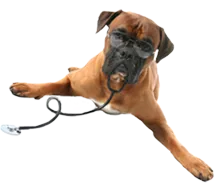The veterinarians at Carbondale Veterinary Clinic are able to perform many surgeries. The most commonly performed procedures are: spays, neuters, feline declaws, ear crops***, and mass removals but others are done and available. If you have questions about the available surgeries please call us!
On the day of surgery, you drop your pet off in the morning, generally between 8am and 9am, unless told otherwise. The night before surgery your pet should have had all food withheld after 10pm and no breakfast on the morning of surgery to help ensure an empty tummy. Our receptionist will then guide you to where your pet is going to stay until they are ready for surgery. Then you will go through and fill out our surgery/anesthesia form, which is linked below if you would like to fill it out and bring it with you on the day of surgery.
Before putting your pet under anesthesia, the veterinarian performs a full physical examination to the best of their ability. HOWEVER, many conditions are not detected on a physical exam. Performing blood work before undergoing anesthesia is another way for the veterinarian to detect underlying concerns and conditions. For these reasons, we HIGHLY recommend blood screening before any surgical procedure to minimize the risk to your pet. The blood test is required for any pets 5 years of age and older. This test helps identify any liver disease, kidney disease, infection, anemia, clotting disorder, and/or diabetes.
We offer other blood tests before surgery as well. For dogs, a heartworm test can be performed to detect the presence of heartworms. Heartworms live in the heart and lungs, both of which are affected by anesthesia. For cats, we offer a combination test that checks for feline leukemia, FeLV, and feline immunodeficiency virus, FIV. These 2 diseases can be spread between cats and we recommend that you test all new cats and kittens entering your household.
If there are any concerns or questions that arise from the physical or prescreening blood test, the doctor will call you to discuss the options and how to best proceed for you and your pet.
If there are no questions, the doctor will proceed to sedate your pet and get them ready for surgery. Your pet will be intubated with an endotracheal tube, a tube placed in the trachea, and hooked up to heart rate and respiratory rate monitors during the surgical procedure. Your pet is also being monitored during the procedure by a technician.
If you have chosen to have an intravenous catheter placed, it will be done prior to giving anesthesia. In the event of an emergency, a pre-placed intravenous catheter allows more rapid administration of life saving drugs. During surgery, fluids are given to help keep your pet hydrated and maintain blood pressure.
We use a combination of pre-anesthetic medications/injectable and/or inhalant anesthetics to achieve the best levels of anesthesia that are safe for your pet. Often for short procedures, an injectable anesthetic is given alone that puts your pet at a good plane of anesthesia to allow surgery to be performed and allows a fairly quick recovery. For longer procedures, your pet is also placed on a gas anesthetic, Isoflurane, which helps maintain the plane of anesthesia.
Our surgeries receive a post-operative pain injection that lasts up to 24 hours after surgery. Surgery can be painful for your pet. It has been shown that humans recover better and faster if they are pain free. It is the same for our pets. We always recommend pain medicine go home with your pet to help with recovery.
We use our therapeutic laser on most of our surgery patients. The laser helps reduce inflammation at the incision, helps increase red blood flow and lymphatic flow, and overall helps encourage healing.

After surgery, the veterinarian will call to let you know how the surgery went and how recovery is going for your pet. If you have questions or have not heard yet, never hesitate to call. We don’t mind if you call to check on your pet later in the day either. We understand how stressful it can be and want to be available for you and your pet.
***Only certain veterinarians at the clinic perform ear crops so availabilty can be limited. Please call with questions and/or to schedule an appointment.

